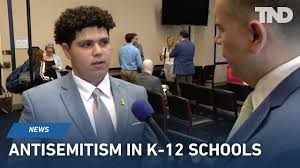From School Boards to Congress: Why Political Power is Key to Ending Antisemitism
- PEER K12
- Apr 20, 2025
- 5 min read
Updated: Jul 21, 2025
Across the country, Jewish students face rising levels of hate, discrimination, and exclusion within their schools. But the root cause of this problem isn’t simply the actions of a few bad actors—it's a systemic issue embedded in policies, ideologies, and local education practices that perpetuate antisemitism.
In fact, as we often say at PeerK12: antisemitism in K-12 education is NOT an education issue—it’s a POLITICAL one.
That’s why political power is the key to creating meaningful, lasting change. We understand that eradicating antisemitism from our education system requires more than just public awareness.
It requires winning political majorities at every level—local, state, and federal.
Why Political Power is Crucial
We live in a world where policies shape our children’s education. There are laws and education codes that dictate which curriculum is taught in classrooms, there are policies and guidelines that outline how schools should address hate speech in schools, and there are lawmakers who decide how schools are both funded and regulated—bottom line: politicians are the ones who have the power to set the agenda.
But what most people don't know is that many of the institutions in charge of K-12 education policies from A to Z are heavily influenced by political ideologies.
Whether it’s your local school board, our state legislatures, or even Congress - decisions that affect Jewish students’ safety and well-being are often made inside political offices. And far too often, the voices of the Jewish community have been drowned out or sidelined.

If you need proof of this - just take a look at the discrepency between the small percentage of Jewish students in any given school and the disproportionately high number of antisemitic incidents in those schools. Yet, many policymakers fail to take meaningful action to prevent such incidents or address the root causes.
Worse still, some of these leaders are actively working to promote ideologies that contribute to antisemitism. This is where political power comes in.
By engaging in the political process at all levels—from school boards to Congress—we can ensure that Jewish civil rights are protected and that policies are put in place to actually combat hate in schools.
Political power gives us the ability to influence the levers that govern education and allows us to demand accountability from those in charge.
Targeting Elections: A Strategic Focus
At PeerK12, we’ve developed a strategic approach to winning political power. Our plan isn’t just about supporting individual candidates—it’s about building a nationwide political movement that galvanizes voters, elects pro-Jewish Civil Rights candidates, and enact policy changes that protect Jewish students.
Here’s how we do it:
1. Starting Local: School Boards
Many people don’t realize how much power local school boards hold. School boards make crucial decisions about the curriculum, safety policies, and discipline procedures in K-12 schools. School boards decide who is chosen and paid to train the teachers in their districts, and they're responsible for setting the tone on how antisemitism is handled in the classroom. If we want to tackle the problem at its roots, we must focus on electing school board members who will take strong stances against hate and discrimination.

PeerK12 engages with candidates and voters alike during local school board elections. Candidates need to understand the nuances of the issues affecting their future constituencies, and constituents must make their voices heard by the select few who will be responsible for upholding existing legal or legislative protections in their communities.
This is an essential and symbiotic relationship - and one that can only be developed at the grassroots level.
By engaging directly with school board members members and candidates who are committed to addressing antisemitism directly, we create a foundation for positive change in the education system. These local victories create momentum that will spread to the state and national levels.
2. Expanding to State Legislatures
While we secure these local relationships, we must simultaneously turn our attention to state legislatures. State legislators have a direct impact on how public schools are funded, regulated, and held accountable.
By targeting specific races in areas with rising antisemitism or weak educational protections, we can work to educate lawmakers to prioritize the fight against anti-Jewish hate in schools.
State-level policy changes can have a wide-reaching impact. For example, we can push for comprehensive oversight legislation, defund programs that promote divisive ideologies, and ensure that schools have the resources to deal with these issues effectively. Policies set at the state level can serve as important precedents that can be adopted nationwide.
3. Reaching the Federal Level: Congress
While most education policy is handled at the state level, the Federal government provides an important layer of protection and oversight that cannot be underestimated. As we saw first hand in May 2024 when PeerK12 participated in the Congressional Hearings on Antisemitism in K-12, the Federal government has the ability to step in when States or local education agencies (L.E.A.'s) consistently fail to protect their most vulnerable citizens.
Congressional oversight can include pushing for enforcement of Constitutional Rights such as Title VI Civil Rights through the federal Office of Civil Rights (OCR) Investigations process.
The federal government also has the authority to withhold funds or defund states that allow indoctrination and discrimination to continue unchecked at the K-12 level; as well as proceed with federal litigation against states or district entities that consistently fail to provide their Jewish students with civil rights protections afforded to all other marginalized groups. By advocating for pro-Jewish and pro-Israel policies to members of Congress, we can ensure that the voice of Jewish students is heard in Washington, D.C.
The Power of Voter Mobilization
None of this is possible without voter mobilization. At PeerK12, we focus on educating voters about the critical role that political action plays in ensuring the safety of Jewish students.

We hold voter education workshops, community events, and grassroots outreach campaigns to engage the broader community—both Jewish and non-Jewish.
In addition to targeting Jewish voters, we actively engage with allied communities—those who may not be directly affected by antisemitism but who recognize the importance of protecting all students from hate.
Building a broad-based coalition of voters ensures that we have the numbers needed to influence political outcomes.
Our work isn’t limited to one community. It’s about uniting diverse groups to create lasting change.
By focusing on both Jewish and non-Jewish communities, we broaden our base of support, ensuring that political power is in the hands of those who will protect Jewish civil rights.
The PeerK12 Strategy: A Winning Formula
The formula is simple: engage, educate, and elect.
We engage with voters and candidates through targeted campaigns.
We educate them on the importance of electing pro-Jewish candidates and advocating for antisemitism-free schools.
And we elect candidates who will champion the cause of Jewish civil rights at every level of government.
PeerK12 doesn’t just wait for change to happen. We make it happen—one election at a time.
By strategically targeting elections from school boards to State Legislatures and even to Congress, we are building a political movement that will have a long-lasting impact on the future of Jewish students and the fight against antisemitism in education.
The Path Forward
The only viable path to ending systemic antisemitism in K-12 education is through political action.
It requires unifying voters, electing strong candidates, and creating policies that protect Jewish students. PeerK12 is leading the charge—but we need your help. Whether you’re voting, volunteering, or donating, you can make a difference in this fight.
Join the movement today, and together we will create a future where antisemitism has no place in our schools.
.png)
















Comments